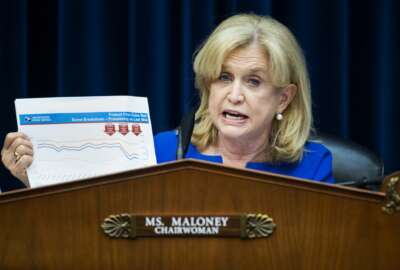
Senate Democrats introduce new bill to block Schedule F executive order
Sen. Gary Peters (D-Mich.), ranking member of the Homeland Security and Governmental Affairs Committee, introduced new legislation Wednesday that would simply...
Senate Democrats are making their own effort to block the president’s recent Schedule F executive order.
Sen. Gary Peters (D-Mich.), ranking member of the Homeland Security and Governmental Affairs Committee, introduced a new bill Wednesday morning.
His legislation would simply nullify the Schedule F executive order — and prohibit agencies from using appropriated funding to carry out the EO or a successor order or regulation.
“This recent executive order will not only strip protections away from hard-working, dedicated civil servants, but it also recklessly creates chaos and dysfunction during the ongoing pandemic and presidential transition,” Peters said Wednesday in a statement.
“Our country is facing a number of serious challenges that must be quickly and effectively tackled, from safeguarding our national security to addressing the coronavirus pandemic — and non-partisan federal employees carry out this critical work,” he added. “I am proud to lead this legislation that will prevent the Trump administration from creating uncertainty for federal employees at a time when their work is incredibly important to protecting American lives.”
The bill has 39 co-sponsors; all of them are Democrats and independents.
The executive order, which President Donald Trump signed last month, gives agency heads the authority to reclassify certain confidential, policy-making, determining or advocating positions from the career competitive service to a new class in the excepted service known as Schedule F.
It also allows agency heads to hire or fire employees to these appointments at will. And it applies to existing career federal positions and future ones, meaning current employees in certain policy-making roles could lose their civil service protections.
Unlike the legislation House Democrats introduced last month, the new Senate bill doesn’t describe a process for converting any positions that may have been reclassified to Schedule F back into the career civil service, nor does it guarantee back pay for employees who may have lost their jobs due to the executive order.
Instead, the Senate legislation would, in essence, retroactively nullify the executive order to Oct. 21, the date the president signed the EO.
“Congress should move quickly to stop Schedule F in its tracks,” Max Stier, president and CEO of the Partnership for Public Service, said in a statement. “The executive order raises the risk of large-scale reclassifications and removals of civil servants over the next two months when our government should be focused on addressing the pandemic, aiding economic recovery and ensuring our national security.”
Stier, along with former federal executives and employee groups, fear the EO could impact tens of thousands of career positions that hold some kind of policy-making or “policy-adjacent” role. It’s up to each agency to determine what positions to reclassify to Schedule F, and the Office of Personnel Management will review and approve them.
Once positions have been approved for reclassification, career employees in those roles can take the new appointment to Schedule F or leave, congressional aides have said.
Some members of Congress and federal employee groups are especially concerned the executive order could be used to burrow in political appointees from the current administration to the next by quickly reclassifying their jobs as Schedule F positions.
Peters’ bill has support from several federal employee organizations, including the American Federation of Government Employees and the Senior Executives Association.
“We appreciate recognition from Congress that this executive order is substantially flawed and must be repealed,” Bob Corsi, SEA’s interim president, said. “SEA endorses this legislation as a necessary check on executive power and a critical starting point for allowing Congress to regain control of the civil service.”
Copyright © 2024 Federal News Network. All rights reserved. This website is not intended for users located within the European Economic Area.
Nicole Ogrysko is a reporter for Federal News Network focusing on the federal workforce and federal pay and benefits.
Follow @nogryskoWFED
Related Stories






